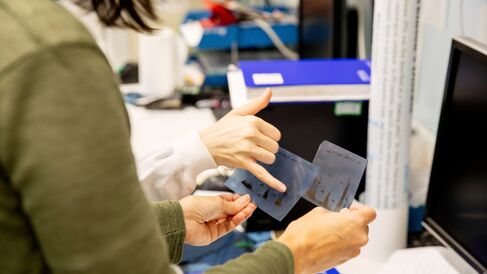
Laboratories play a vital role in advancing knowledge but are among the most energy-intensive spaces in a university setting. Typically, labs consume 3 to 10 times more energy per square metre than office spaces, due to specialised equipment, temperature control, and ventilation needs.
At the Cambridge Centre for Advanced Research and Education in Singapore (CARES), the team have been working to reduce their environmental impact, and in recognition of these efforts, have been awarded Silver level certification through the international Laboratory Efficiency Assessment Framework (LEAF) programme.
CARES and its sustainability commitment
Established in 2013, CARES is the University of Cambridge’s first overseas research centre bringing together researchers from the University of Cambridge, Nanyang Technological University and the National University of Singapore to develop scientific advances and technologies.
The CARES laboratory is home to several facilities that are rare or unique in Singapore and actively supports collaboration by offering access to its equipment for other researchers in the region where possible.
The LEAF programme is a certification for environmental sustainability of laboratories. It is a standard set by University College London (UCL), and 85 institutions are already taking part globally, including the University of Cambridge. It comprises four elements: an online framework for setting out sustainability actions, online calculators to measure financial and carbon impacts, a toolkit and resources, and user training and engagement.
CARES has actively participated in the LEAF programme, overseen by the University of Cambridge’s Environmental Sustainability Team, with the laboratory achieving Bronze certification in 2023, Silver in 2024, and is now aspiring for Gold status in 2025-26, reflecting outstanding progress in improving environmental performance across its operations.
Funding for this project came from the National Research Foundation (NRF), Prime Minister’s Office, Singapore under its Campus for Research Excellence and Technological Enterprise (CREATE) program.
Digital innovation for energy savings
As part of The World Avatar project within the Cambridge Centre for Carbon Reduction in Chemical Technologies (C4T) programme, CARES researchers have been developing and expanding digital tools to help labs run more efficiently. The work focuses on connecting and organising data from different systems – like equipment, energy use, and building management – so it can be used in smarter, more useful ways.
The CARES laboratory became a real-world test environment for these tools. Researchers digitalised and automated lab operations using their Digital Lab and Facility Management Innovation Apps, making it easier to track and reduce water and energy use without disrupting research. This work played a key part in achieving the lab’s LEAF Bronze recognition and laid the foundations for continual improvements that earned CARES their Silver award.
Key outcomes
- Real-time digital energy data displayed on a Lab Dashboard interface to show lab equipment health and use.
- A 6% reduction in chilled water use by optimising lab air flow exchange.
- 5% reduction in electricity through improved lighting design.
- Further energy savings of 5% through reduced standard temperature of the hot ovens (always set back to 60˚C) and freezers (standardised to -10˚C instead of previous -20˚C, a 30% reduction in freezer energy consumption).
- Introduction of live alerts notifying staff if energy-intensive equipment, such as chemical fume hoods, is left open when not in use.
This work, published in the journal Nexus, demonstrates how digital technologies can transform the day-to-day management of research facilities. Through remote monitoring of equipment and energy use, lab teams can make smarter, evidence-based decisions that improve efficiency and sustainability.
This is one example of how our researchers are contributing to the Concordat for the Environmental Sustainability of Research and Innovation Practice.
